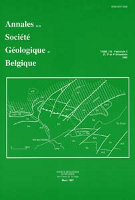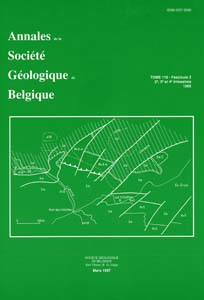- Accueil
- Volume 116 (1993)
- Fascicule 2 - Carboniferous biostratigraphy
- Biostratigraphy and sequence stratigraphy at the Devonian-Carboniferous transition in southern China (Hunan province). Comparison with southern Belgium
Visualisation(s): 585 (13 ULiège)
Téléchargement(s): 1021 (13 ULiège)
Biostratigraphy and sequence stratigraphy at the Devonian-Carboniferous transition in southern China (Hunan province). Comparison with southern Belgium

Résumé
Dans le Sud de la Chine, les couches de passage du Dévonien au Carbonifère sont bien exposées dans de nombreuses coupes qui reflètent des environnements sédimentaires différents. Les dépôts mixtes carbonatés-siliciclastiques ont été étudiés dans les coupes de Oujiachong, Malanbian et Sujiaping situées dans le centre du Hunan. La limite dévono-carbonifère coïncide avec la limite entre les Formations de Menggongao et de Malanbian. L'approche biostratigraphique par des groupes fossiles différents (conodontes, foraminifères, spores, ostracodes, brachiopodes, coraux rugueux et tabulés) a donné des résultats cohérents qui servent de support pour retracer l'évolution sédimentaire. De fortes similitudes sont observées avec le Sud de la Belgique, permettant d'établir des corrélations stratigraphiques et séquentielles entre ces bassins sédimentaires très éloignés.
Abstract
In southern China, the Devonian-Carboniferous transitional strata are well exposed in several sections representative of different sedimentary environments. The siliciclastic-carbonate deposits have been investigated in the Oujiachong, Malanbian and Sujiaping sections situated in central Hunan. The Devonian-Carboniferous boundary coincides with the boundary between the Menggongao and the overlying Malanbian Formation. Study of different fossil groups (conodonts, foraminifera, ostracods, spores, brachiopods, rugose and tabulate corals) gives coherent biostratigraphical results which form the framework for reconstruction of the sedimentological evolution. Strong similarities are observed with southern Belgium allowing biostratigraphical and sequence stratigraphical correlations between the two distant sedimentary basins.






